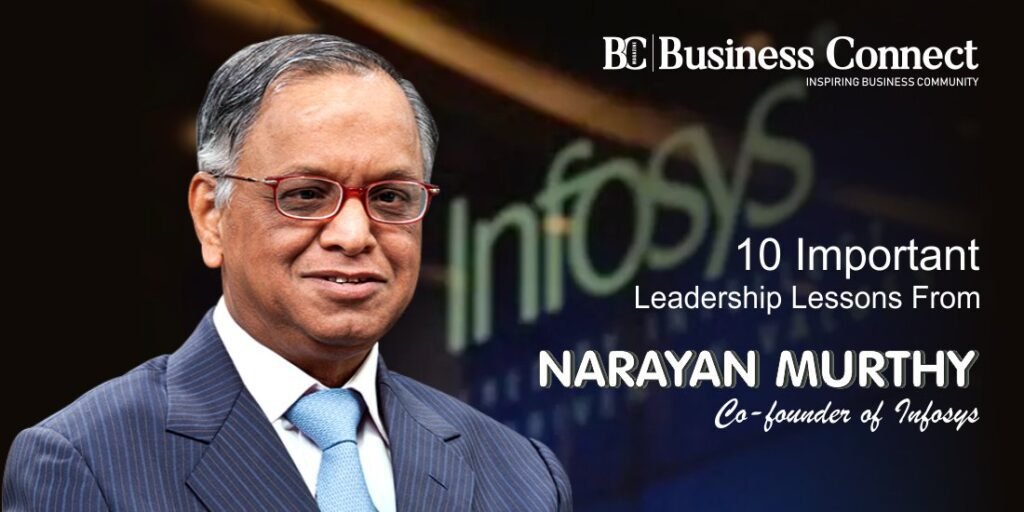10 Important Lessons from Narayan Murthy: Co-founder of Infosys
“Start-ups are about entrepreneurs coming up with an idea whose proposition is very different from any existing idea in the market. Start-ups are about a set of people whose collective experience can test an idea’s market fit and scale it up”. – Narayan Murthy
Infosys Co-founder NR Narayana Murthy has been inspiring generations of techies and leaders with his brilliant mind and great business acumen. Here are a few Leadership lessons to be learned from the man known as the “Father of Indian IT.”
N.R. Narayana Murthy, Infosys’ legendary co-founder, and retired chairman continues to own a minority stake in the company. Murthy was listed by Forbes Magazine as an entrepreneur and global leader of next-generation digital services and consulting with a net worth of $ 3.6 billion as of March 25, 2021. Infosys has grown from six people in 1981 to a corporation with 242,371 employees, 10-12 million square feet of space, Rs 25,927 crore in sales, Rs 5,197 crore in earnings, a market capitalization of $78.73 billion, and operations in 46 countries.
Early Life
Narayan Murthy was born to a middle-class family in Shidlaghatta, Karnataka, on August 20, 1946. He earned his bachelor’s degree in electrical engineering from the University of Mysore and his master’s degree from IIT Kanpur. He served as a chief systems programmer at the Indian Institute of Management in Ahmedabad and at Patni Computer Systems in Pune before joining Infosys (Maharashtra). Murthy has received the Padma Vibhushan and Padma Shri awards for his achievements. Murthy married his sweetheart Sudha Murthy on February 10, 1978.
Narayana Murthy is one of those rare individuals whose lives are the living embodiment of achievement. A successful entrepreneur, according to Murthy, possesses the qualities of competency and leadership. Learnability, bravery, the spirit of sacrifice, satisfaction, and a strong value system are all qualities that can be learned.
Here are 10 lessons from Narayana Murthy’s Life on how to be a better leader to learn from his experience.
- Be Fearless
The most critical quality of a great leader is courage. To dream big and make bold decisions, one must be brave. As Murthy points out, one must have the courage of conviction, courage to defy conventional wisdom, and courage to take the path less travelled.
- Be Quick-witted
Murthy says it’s important to continue innovating and bringing new concepts and paradigms to the platform. He recently stated in a virtual event with students and faculty from the Great Lakes Institute of Management that the NEP (National Education Policy) 2021 only facilitates reform, and that true transformation can only occur if children are taught curiosity, pluralism, and open-mindedness from an early age.
- Be in a Positive frame of mind
The majority of our energy is determined by our mental state. Physical energy can come to you on its own if you are full of excitement, hope, faith, and joy.
- Set up mentorship programs.
Any leader’s primary goal should be to ensure that there are successive generations of leaders. Mentoring is one of the tools for accomplishing this. Not only can a good mentor train the team, but he or she can also get the most out of each person.
- Respect your rivals
Never ever underestimate your competitors. “Still respect them and take everything you can from them. And that’s how you’ll get the upper hand on them”.
- Keep your Ideas to yourself.
Always believe in your idea and stick to it, no matter what. “When we first started out, the market was aggressive. Getting a phone line took a year, and getting a software import licence took three years. We do, however, understand that there was a major global opportunity, and we are sticking to our plan.”
- Say The Right things And Do It
A good leader should be able to instil a strong value system in his or her organization. Revenues would naturally follow whether you have earned the confidence of our partners, customers, consumers, or everyone else. “Grapevine flies so far that it replicates itself after you’ve demonstrated your belief system in action,” says Murthy.
- Be Ready To Take Advantage Of Chances
While hard work is important every journey needs a certain amount of luck. Many intelligent people have worked tirelessly throughout their lives but have achieved nothing. But, as the saying goes, luck comes to everyone, but only the prepared can catch it.
- Be Dependable.
“Leaders, I’ve discovered, must first be trustworthy in order to be high performers.” Investors should still be informed of negative news as soon as possible. “The good news should take the stairs, while the bad news should take the elevator. Those companies that admit their errors and commit to change will be respected by investors.”
- Don’t be too hard on yourself.
Expectations should not be used to pressure one’s way of doing things. “We take our jobs seriously, but not so much about ourselves.”
Also read:- Leadership Test in the Time of Global Pandemic



